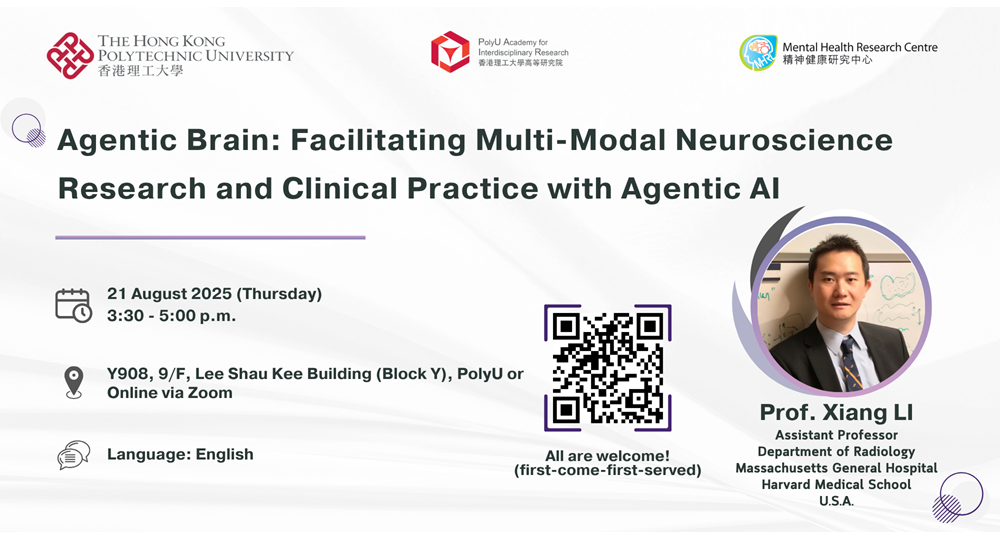MHRC Research Seminar: Agentic Brain: Facilitating Multi-Modal Neuroscience Research and Clinical Practice with Agentic AI
Conference / Lecture

-
Date
21 Aug 2025
-
Organiser
Mental Health Research Centre
-
Time
15:30 - 17:00
-
Venue
Y908, 9/F, Lee Shau Kee Building (Block Y), PolyU or Online via Zoom
Enquiry
Ms Carol Yau 2766 4445 carol-mui.yau@polyu.edu.hk
Remarks
Registration starts at 3:15 p.m.
Summary
Enjoy free admission, all are welcome.
* Seats are limited and will be allocated on a 'first in, first served' basis.
* Online link will be provided if the seats are full.
* Please note that NO Physiotherapy (PT) and Occupational Therapy (OT) CPD points will be offered by the research seminar.
Topic:
Agentic Brain: Facilitating Multi-Modal Neuroscience Research and Clinical Practice with Agentic AI
Speaker:
Prof. Xiang LI
Assistant Professor
Department of Radiology
Massachusetts General Hospital
Harvard Medical School
U.S.A.
Abstract:
As biomedical AI systems evolve beyond narrow, single-task models toward more generalist frameworks, a central challenge/opportunity lies in enabling dynamic, interpretable reasoning across heterogeneous, incomplete, and deeply contextual data. This challenge is especially prominent in neuroscience, where diverse data modalities, complex clinical workflows, and nuanced human expertise intersect across research, neurology clinics, and mental health care. In this talk, Prof. LI will outline his team’s vision of agentic AI as a transformative approach for this landscape. Building on its early work in biomedical foundation models, Prof. LI’s team proposes a general system architecture in which domain-specific foundation models act as autonomous agents, each contributing specialised analyses, contextual reasoning, and evidence synthesis. These agents are coordinated by a highly capable “Meta-Agent” that orchestrates collaboration and integrates outputs. This agentic framework is designed to align dynamically with the evolving goals and needs of researchers, clinicians, and patients. By embedding this architecture in neuroscience, Prof. LI's team aims to bridge data modalities, disciplinary boundaries, and care paradigms to enable more interpretable, collaborative, and adaptive AI systems for both research and clinical practice.
Biography:
Prof. Xiang LI is an Assistant Professor of Radiology at Harvard Medical School and Massachusetts General Hospital. He leads multiple research projects focused on medical imaging, medical text analysis, and multimodal data integration, with a special emphasis on developing artificial general intelligence (AGI) solutions tailored for complex clinical scenarios. He has also contributed to the computer science and AI community on methodology developments for dictionary learning, human-machine alignment, and diffusion models.
Prof. LI has published over 150 papers in top journals and conferences, including Nature Medicine, IEEE TPAMI, NeurIPS, ICLR, ICML, etc. with more than 11,000 citations and an h-index of 50. He serves on the editorial boards/area chairs of several international journals and conferences, including IEEE TMI, IEEE TAI, NeurIPS, AAAI, and MICCAI. In 2019, he initiated and founded the International Workshop on Multiscale Multimodal Medical Imaging (MMMI). His research has been supported by the U.S. National Institutes of Health (NIH) and multiple organisations. Prof. LI’s work is recognised by awards including Google Scholar Program Award, Thrall Innovation Grants Award, the NVIDIA Global Impact Award, and multiple Best Paper Awards from leading journals and conferences.


